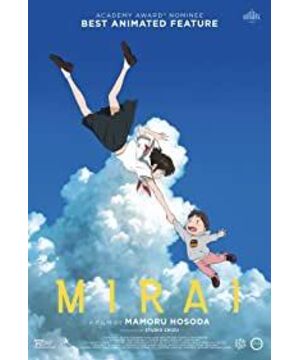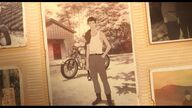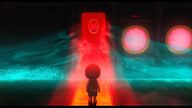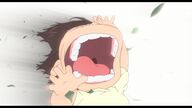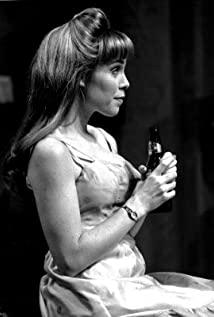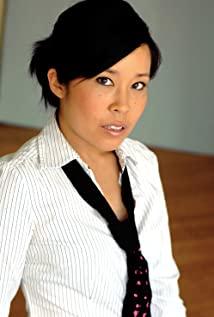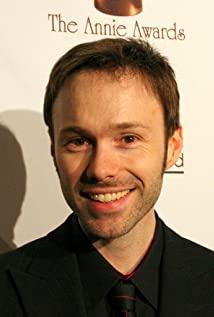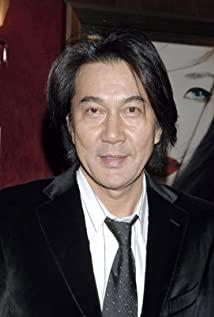One thing to say, when I saw the "large-scale Japanese second-child promotional film" in the short comment, I was resisting, and I wondered if Hosoda Mori started a large-scale confusing behavior again? But after I read it, I found that this is not a good thing about the second child. It is clearly throwing all the problems caused by the second child before you, and triggering your reflection on fertility from psychology to physiology. This theme is simply following the trend of the times. In the case of the declining birthrate in the whole East Asia, Mamoru Hosoda fully shows us the hardships of raising children in modern times.
In fact, this story is very simple and plain, to what extent? Simpler than "Son of the Monster", more everyday than "Summer Wars". ("Wolf Children Rain and Snow" really didn't watch)
One sentence summary is to talk about the destruction and reconstruction of the family order of a two-child family (family of four). The original one-child family is a stable triangular structure. The elder brother Junjiang enjoys all the attention, and the parents can maintain their work and work. life balance. But when the second-born sister Mizu-chan was born, the family order that had tended to be stable was broken. Before the birth of the younger sister, the whole family could be said to revolve around Jun-chan. The birth of the younger sister made the family focus on Mizu-chan, and this gap changed Jun-chan's mood. For Jun Jiang, the future is an intruder in his life, breaking his monopoly in the attention of the whole family, which is like a toy being robbed for a child. He can't accept the fact that he has fallen out of favor, he can't understand the meaning of family, so he can't accept her.
What the film tells is the process of his gradual acceptance of the future from the perspective of Jun Jiang, the process of accepting his "falling out of favor", the process of understanding the meaning of his family, and the process of rebuilding the family order and extending the family form.
1. Adolescent growth and family identity
Although many people criticize Jun Jiang for being a child and Mizu Jiang for promoting the second child, in fact Mizu Jiang is only the fuse of family conflicts, and this fuse is still the growth of Jun Jiang.
From a vertical perspective, Jun Jiang's growth is the main line of the story. Around the tree in the family's inner courtyard, Jun Jiang began his own "fantasy drifting". Jealousy towards his younger sister, being angry with his mother, going to practice cycling with his father, and being angry with himself not to go camping. These four little things made him meet his future self and sister, and his mother and grandfather from the past. The future self and sister are the mature side, while the past mother and grandfather (representing the father) are the growing side. Every time and space shift occurs when Jun-chan wants to avoid or say irrational/emotional performance, such as teasing the future instead of getting along, throwing away the bicycle helmet instead of looking forward, getting the mother's attention by throwing toys instead of Be considerate of mother, prank with pants instead of making good memories...
In a sense, his behaviors of teasing the future, throwing his temper, and anger are all fighting against the family, and he is eager to learn to ride a bicycle, and he hopes to be like a teenager (from here, he has already reflected his yearning for growth ). What the future self gave him was the regret of growing up, while the parents in the past gave him the experience of growing up. He gradually began to think about how to get along with his family, how to deal with his emotions and desires, and gradually grew from a child to a teenager. When he called out Mirai-chan's name at the meeting point of the same different world, he finally accepted Mirai-chan, abandoned his emotional behavior in the past, reached a reconciliation with himself, and became part of the family.
2. Contact and inheritance
Regarding family identity, Hosoda Mori's works in recent years seem to have been like this. If "Summer Wars" is not obvious, then the identity shown by "Monster's Son" is very strong. And "Future of the Future" extends this system to four generations living together (family to family), and is more flattened (daily series, human series). The dramatic conflict in the whole article is limited to Jun Jiang and the second-child family. Although it seems a little childish, it is indeed a daily life and has more practical significance (personal and family).
As a movie, its structure is really loose. If I split it into four episodes of TV, I don’t think there is anything wrong with it. It is a narrative in the form of a diary and a unit drama. The big theme makes the connection between the episodes fairly close, and the "tree" as the trigger also makes the movie a lot more interesting.
Hosoda Mamoru is very partial to the three-degree separation. From "Our War Game", it is the digital world opened by the divine plan, and the time-travel opened by running later. In this book the tree takes on this role, as a link between the past, the present and the future. Although the tree is the contact point of time and space, it is actually triggered by related events. It can be said that people or things caused the event. For example, Jun Jiang was riding a bicycle badly, throwing a helmet and successfully crossing to his grandfather. Jun Jiang's anger has become the key to open the time-space shuttle, reconciling through a past or future event, and the final Tokyo Station is more like a "heart world".
It can be clearly felt that as an Internet generation, the digital world has a deep imprint on Hosoda Mori. From "Digital Tyrannosaurus", "Summer Wars" to "Future of the Future", the trees here have been processed into a kind of approximation. In the form of the digital world, it records the memory of the family (materialized, you can see the family's photo album, etc.), and it will be passed on forever. At first, I wondered if it would be a setting similar to animism, but no, the setting similar to event extraction makes it more like a family database, and you will know more about this family through those past memories. Deep, this impression will prompt you to become part of the family. At the same time, you will continue to update, create new memories, and let this big branch flourish.
3. Main line and branch line
In dealing with the main line of Jun Jiang's growth, we also saw the sub-plots of other family members, the most distinctive of which is "My Father and Mother". When Jun Jiang was born, his father worked hard outside, while his mother worked full-time at home. When the future is born, the father quits his job and goes home to take care of the child, and the mother works outside. This is an extremely idealized family division of labor, with equal consultation among internal personnel, and there is no remnant of a feudal family. In this kind of respectful relationship, every family member participates in the construction of family order, and full understanding is the basis of understanding, and full understanding makes harmony possible.
As my father said at the end, "It seems that I have grown a lot." Compared with the second child, the construction of family order is the theme that we should pay more attention to.
View more about Mirai reviews


